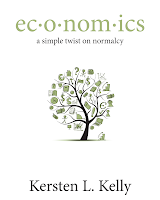Kersten L. Kelly is a self-published author of narrative non-fiction and semi-fiction books. She grew up in Munster, Indiana, and currently works in a sales role based out of Chicago, Illinois. She started writing at an early age and graduated from Indiana University with a dual Bachelor’s Degree in Economics and Communication & Culture. She then went on to earn a Master’s in Business Administration from the Kelley School of Business at Indiana University. She has a passion for learning, teaching, and writing as well as international travel in her spare time.
For more information on Kersten L. Kelly visit her website.

The young woman was describing her current occupation which included the words “Dove’s Campaign for Real Beauty.” Normally, I would have eavesdropped without actually saying anything, but I couldn’t help but inquire about her position with the campaign. She led on that she was one of the former models for the campaign, and now she is a spokesperson and motivational speaker for women throughout the country. As controversial as the campaign was, I remember thinking what a great message it conveyed. The premise of the campaign was that women of all colors, shapes, and sizes are beautiful despite what the media portrays to be a “normal” representative of the female population in the United States. Models photographed for the campaign were depicted in their underwear, without airbrushed touch-ups or excessive make-up, and the majority of them were of average physical appearances. The public was accustomed to viewing thin, perfected models in advertisements.
After engaging in their existing conversation, I learned that she used her experience with Dove to forward that message on to women all over the country. She travels to publicly speak about how to love your body, self-image, and appearance as it is without having to achieve unrealistic expectations. As I listened to her describe her routine, I thought of a television show that I’ve seen that exploits and rears young girls into being in pageants. At very young ages, the girls are dressed in scandalous clothing, painted with layers of make-up, and flaunted around a stage only to be judged for their appearances. Being the opinionated (and extraordinarily extroverted person that I am), I shared my candid opinion on the show emphasizing my disgust with the actions at such an early age. I asked if she ever included information about what a negative impact this could have on children and their self-image.
She responded by saying “In all of my speeches, I focus on the positive. The information I provide is supposed to educate women on how to love themselves. It wouldn’t do me any good to stand up in front of a crowd of women and talk about the thousands of ways people engage in poor body image practices. I’ve found that clients respond much better when I discuss how to be positive and encourage them about their physical appearance.” She was right. This actually shut me up fairly quick (which is pretty atypical), and I couldn’t help but just nod and agree with her process.
I enjoyed the rest of my conversation with her because I was able to argue back and forth with her about self-image and share my knowledge and thoughts on the topic. She agreed off record that the show I mentioned was portraying the wrong self-image norm for children but the presentation of the argument is much more important than the argument itself. We chatted about the subject until they called us to board the plane.
I ended up not sitting by her on the flight, but I thought a lot about what she said. Instead of focusing on the negative in any context, it is much more effective to highlight progressive aspects. People are much more willing to respond and actually engage with an encouraging connotation. I am going to adapt to her delivery method and keep this life lesson close. Think positive!

Professional football players, corporate tobacco advertisers, volatile gasoline prices, and the Cold War all share an undetected commonality—each is an intrinsic part of economics. Though not obvious to the naked eye, each entity shares a pattern with the others. This book helps to shed light on these mutual characteristics. It is an extensive compilation of theories interpreted using supportive examples written in a narrative non-fiction format. The overarching goal of the book is to provide readers with a non-textbook account of economics in our world that they can actually relate to and enjoy.
You can purchase Economics at
Amazon
Barnes & Noble
CreateSpace
Smashwords







